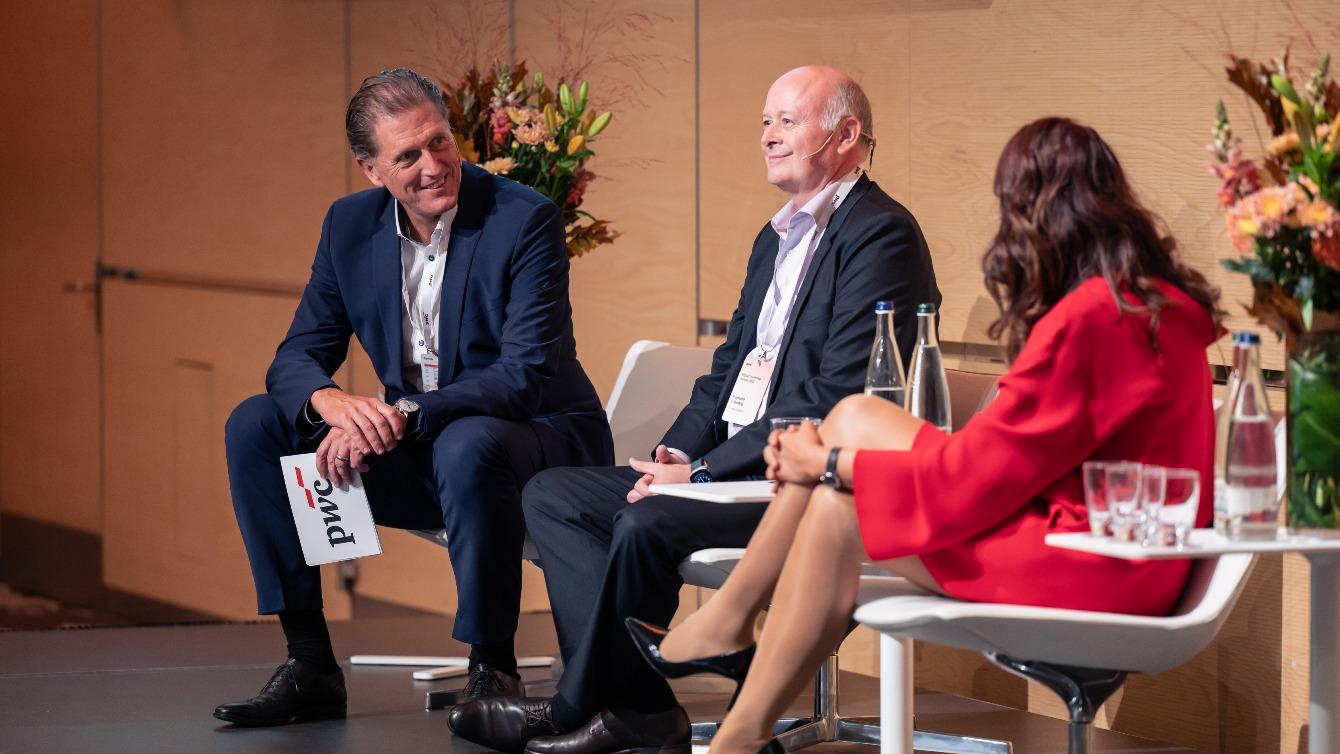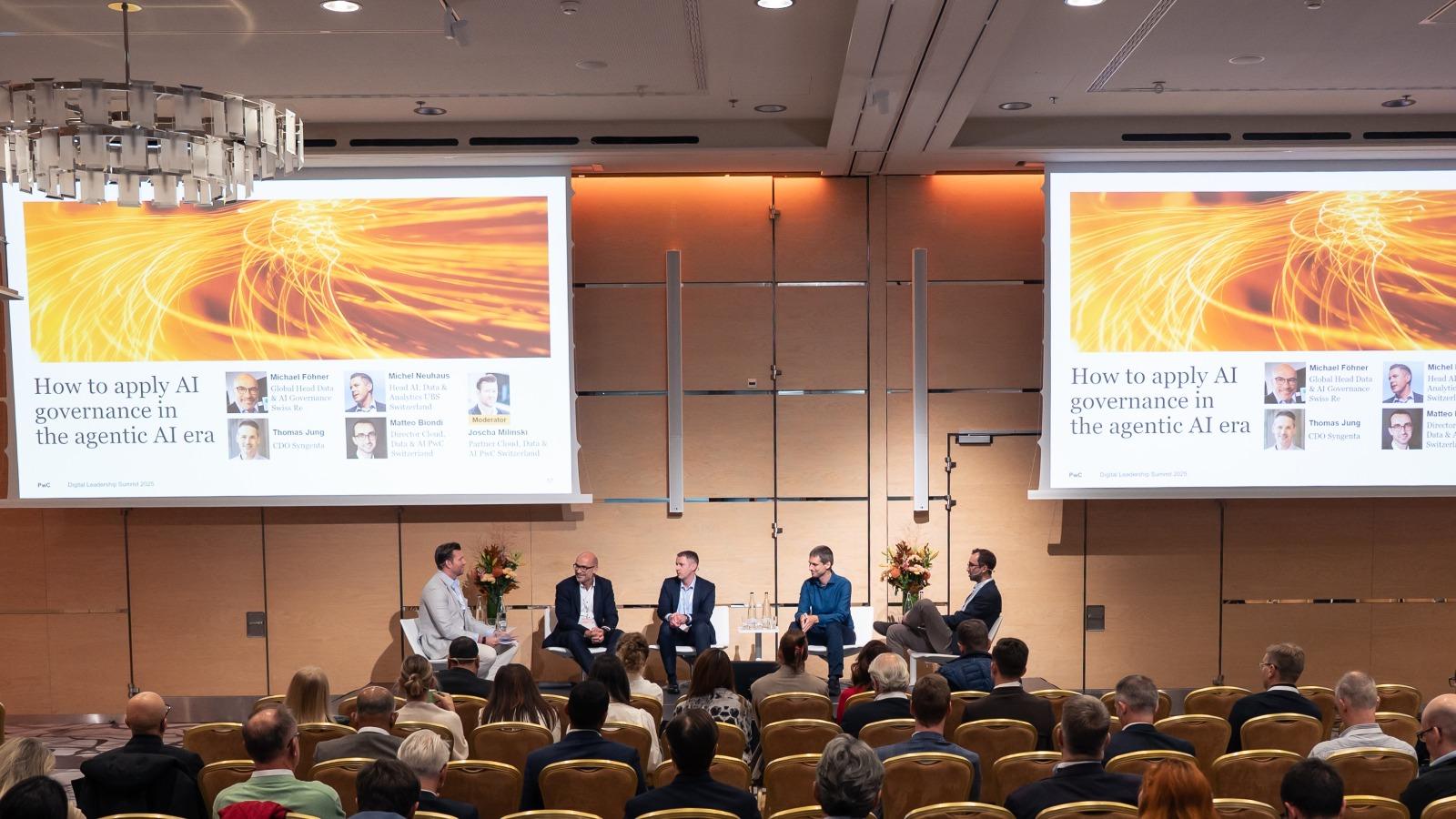Our annual technology flagship event "Digital Leadership Summit 2025" brought together Swiss and global leaders to address the urgent need for transformation in an era defined by AI and rapid technological change.
With 42% of CEOs believing their companies will not remain viable without significant change, and many generative AI pilots failing, the summit underscored the imperative for organisations to rethink strategies, governance, and leadership models.
This event summary distills the key themes and actionable insights for executives navigating this evolving landscape.
The urgency of transformation
The summit opened with a welcoming speech from Prafull Sharma with a sobering statistic: 42% of CEOs worldwide believe their companies won’t be viable in ten years if they stick to their current course, “if companies are not rethinking their business with AI at the core, they’re already behind.” A recent MIT study added fuel to the fire, revealing that 95% of corporate GenAI pilots are stuck in the experimental phase, unable to deliver real impact.
The consensus? We’re at a turning point.
The question isn’t whether to adopt AI, but how to use it to truly reinvent business models—not just squeeze out a bit more efficiency. As one of the panelists shortly after remarked, “The GenAI Divide is real. Leaders who don’t bridge it risk becoming obsolete”.



The Vision: The AI-Centered Enterprise
The keynote from IMD analytics & AI professor Amit Joshi, “The AI-Centered Enterprise,” set the tone for the day: AI is the new electricity, destined to power every aspect of business, similarly to how little electricity potential was exploited in its first 50 years after discovery, so the opportunities opened by AI still remain untapped. Simply using AI for incremental gains is a missed opportunity. The real prize is building an AI-Centered Enterprise (ACE), where AI isn’t just a tool—it’s the core operating system.
What does this look like?
Context-Aware AI (CAI): systems that understand the nuances of business, from scheduling meetings to orchestrating complex supply chains
AI Agents as Colleagues: autonomous agents that act as true team members, handling tasks, managing data, and collaborating. “We’re not just automating tasks,” said a summit speaker, “we’re reimagining what it means to work together.”
The professor introduced the “3 Ps” for Success: People, processes and proprietary data
The keynote concluded with an invite to the audience: “the world needs more Henry Fords”, we must rethink the ways our companies operate and unlock the real power of AI, as Ford did with electricity, using it not simply for metal plating but leveraging it to disrupt the entire automotive industry.
Strategic execution: Innovation, governance, and speed
How do you transform while still delivering results?
This was one of the driving questions in the first two panels:
“Insights from industry CEOs: transforming the future”, moderated by Prafull Sharma with Laura Meyer (CEO of Hotelplan), Steven Neubauer (CEO of Adcubum) and Vivian Mohr (President of Bauer Media Audio) as panellists
“Scale-up CEOs: the mindset for innovating in uncertainty”, moderated by Marcel Härtlein (Group Head, Digital & IT at Lalique Group) with Lukas Obrist (Chairman and CTO of Swiss Drones), Pranay Jain (CEO and Co-Founder of Enterprise Bot) and Nimrod Malinas (CEO and Founder of Robonnement) as panellists
During both sessions the key discussions points were focused on:
Legacy as an asset: don’t just see legacy systems as technical debt—they can be a springboard for the future. One of the CEOs on stage shared a smart approach: split R&D evenly between modernizing legacy, building new features, and pursuing true innovation
Governance as an accelerator: with AI regulations on the rise, governance must enable speed, not slow it down. Start by creating an AI model inventory, establishing robust data and AI governance, and embedding compliance into product lifecycles, as it was emphasised: “Governance isn’t a blocker—it’s the enabler of sustainable speed”
Strategic bets: in uncertain times, leaders must place smart bets—balancing efficiency with disruptive innovation, and empowering teams to prioritise using frameworks like “Fun, Fame, or Fortune”
The human imperative: People at the heart of AI
Throughout the summit, one theme stood out: people are both the biggest challenge and the greatest opportunity in the AI revolution.
While technology races ahead, culture, leadership, and skills are struggling to keep pace. People and governance were the topics at the center of the “AI Governance specialists: navigating innovation and risk in business transformation” panel moderated by our Cloud, Data and AI partner, Joscha Milinski, which saw our AI expert, Matteo Biondi, discussing with data leaders from the industry: Michel Neuhaus (Head AI, Data & Analytics at UBS Switzerland), Thomas Jung (CDO at Syngenta) and Michael Föhner (Global Head Data & AI Governance at Swiss Re).
The main three takeaways on the topic throughout the discussion were:
Leadership redefined: CEOs are shifting from “the person who knows the most” to leaders who excel at empathy, judgment, and communication. “Success today means creating psychological safety and encouraging experimentation”
A new learning culture: the old model of education and work is outdated. Leaders championed radical ideas like a “three days working, two days learning” week, and dedicating two hours a day to personal growth. “The future isn’t just about using AI—it’s about building and managing specialized AI agents”, for personal and enterprise use, said one executive, “at some point in time, your company will have more agents than employees”
Middle management in flux: the “squeezed middle” must evolve from task oversight to coaching and enabling teams. Entry-level roles are also in question; guiding young talent toward their passions and developing expert judgment will be crucial in a world flooded with AI-generated content



The path forward: Leadership principles for 2025 and beyond
Before wrapping up the summit, the last session, the “Fireside chat on Strategic leadership and tech-powered innovation” moderated by our CEO Gustav Baldinger with Martha Boeckenfeld (CEO & founder of marthaverse and peace Ambassador at UN) and Raymond Schnidrig (CTO of Partners Group) focused on key leadership aspects of the future.
This last discussion, and the whole Summit distilled a clear roadmap for leaders ready to embrace the AI era:
Champion a people-first mindset: lead with empathy, transparency, and a culture of learning
Reimagine work and learning: make continuous upskilling a core part of your organisation, with the above-mentioned approaches of “three days working, two days learning” week and personal commitment to 2 hours daily upskill
Go beyond efficiency: use AI to create new products, services, and business models—not just optimize the old ones
Govern to accelerate: build responsible AI guardrails from the start to empower innovation
Start small, start now: give your people the freedom to experiment with specialized AI agents. Grassroots innovation will drive the next wave of success
As Prafull Sharma summed it up while closing the Summit:
“The journey to becoming an AI-Centered Enterprise is a marathon, not a sprint. The leaders who combine vision, people-focus, and decisive action will shape the future.”
Subscribe to PwC insights
Our insights. Your choices.
Contact us
Partner Technology Strategy & Transformation and Technology & Data FS Leader, PwC Switzerland
+41 58 792 18 72
Joscha Milinski






